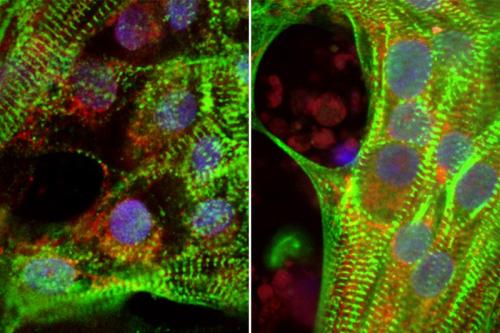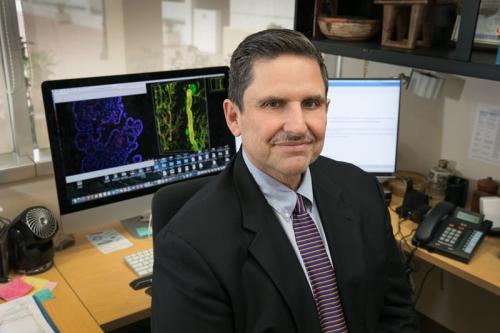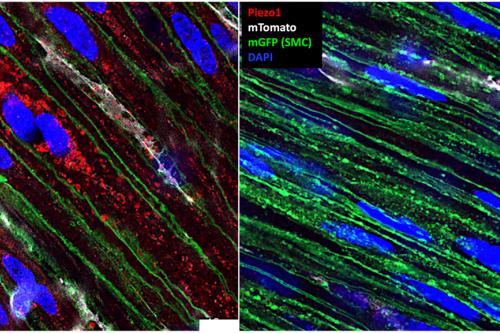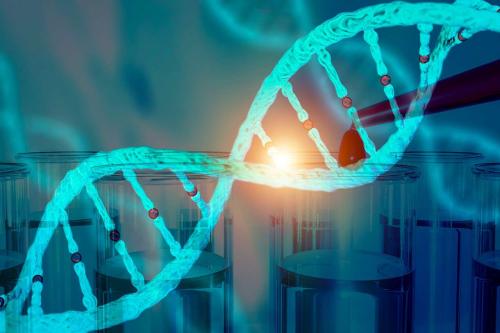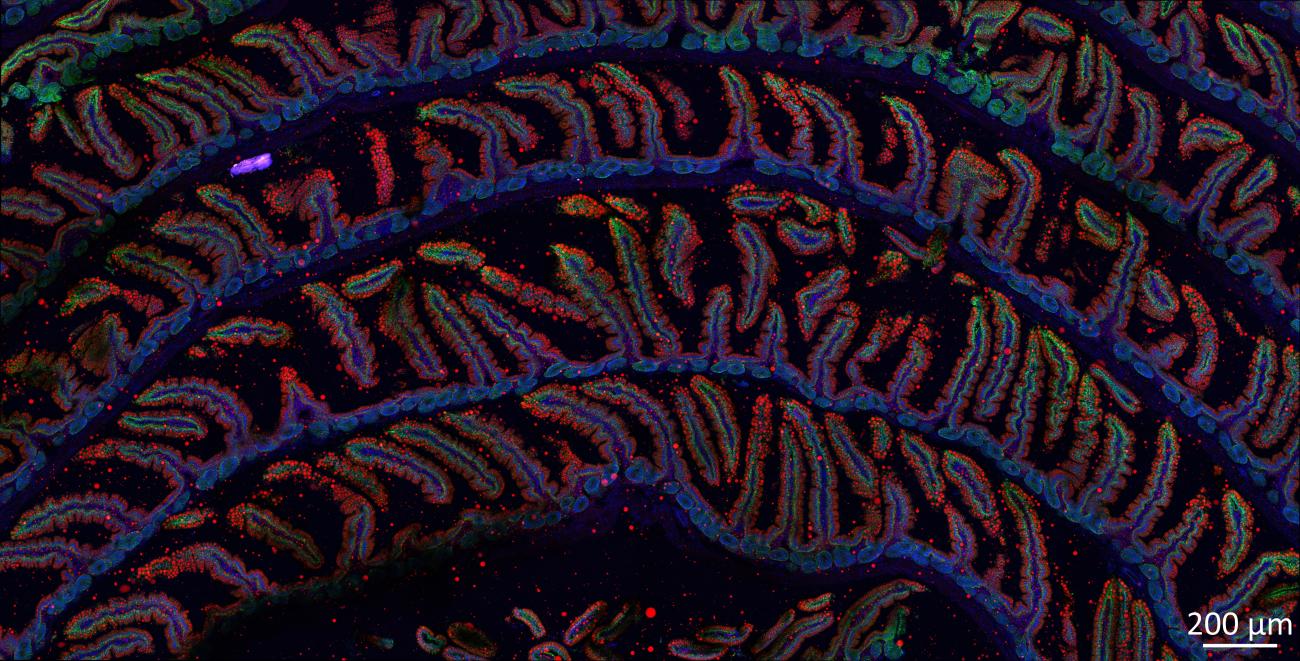
Gastrointestinal & Metabolic Diseases
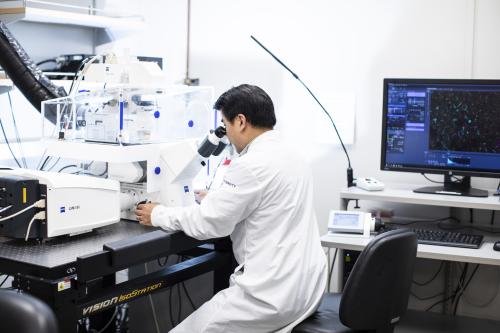
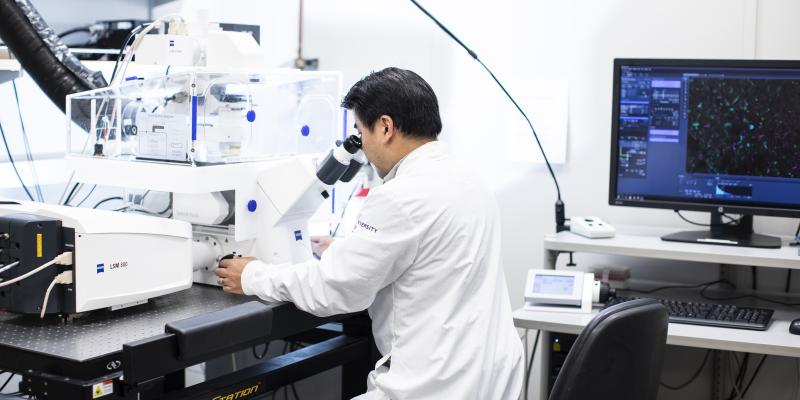
Overview
Gastrointestinal diseases affect the passageway of the digestive system through which food and liquids travel. As many as 11% of Americans have these often chronic diseases that can present with debilitating symptoms and severely impact quality of life. In some cases, like in severe diarrheal disorders, patients are unable to properly absorb nutrients and can die without daily infusions or an intestinal transplant. To develop novel gene therapy A technique that uses a gene or gene(s) to prevent, treat or cure a disease or disorder. Most gene therapies work by adding a healthy version of a gene to replace one that is defective or missing into the genome of particular cells. Some of these therapies use viral vectors to deliver genes into target cells. gene therapy A technique that uses a gene or gene(s) to prevent, treat or cure a disease or disorder. Most gene therapies work by adding a healthy version of a gene to replace one that is defective or missing into the genome of particular cells. Some of these therapies use viral vectors to deliver genes into target cells. strategies, our scientists are devising methods to manipulate intestinal stem cells Cells that have the ability to differentiate into multiple types of cells and make an unlimited number of copies of themselves. stem cells Cells that have the ability to differentiate into multiple types of cells and make an unlimited number of copies of themselves. to correct disease-causing mutations in genes that control gut function. They’re also creating intestinal organoids grown from patient-derived induced pluripotent stem cells iPS cells are cells taken from a patient that are reprogrammed so that they can undergo differentiation into any type of cell in the body. By maintaining the genetic code of the patient, iPS cells play a crucial role in disease modeling and regenerative medicine. induced pluripotent stem cells iPS cells are cells taken from a patient that are reprogrammed so that they can undergo differentiation into any type of cell in the body. By maintaining the genetic code of the patient, iPS cells play a crucial role in disease modeling and regenerative medicine. to screen potential drug candidates. These efforts could lead to treatments for common digestive disorders such as irritable bowel syndrome, Crohn’s disease and chronic acid reflux, as well as severe rare diseases.
Metabolic diseases disrupt normal metabolism, the chemical reactions in the body’s cells that convert food into energy. Center researchers are improving stem cell-derived disease models and advancing gene and cell therapies for complex metabolic disorders like diabetes and obesity. Investigators are working towards new treatments for insulin resistance by measuring the metabolic abnormalities that cause Type 2 diabetes. They’re also uncovering how nutrient levels impact obesity-related inflammation The body’s natural response to an injury or infection that occurs when an immune response is triggered to promote healing. However, chronic inflammation — inflammation that happens even when there’s no injury or invader — is an abnormal immune response. Over time, chronic inflammation can damage healthy cells, tissues and organs and lead to diseases such as cancer, diabetes, Alzheimer’s disease and autoimmune diseases. inflammation The body’s natural response to an injury or infection that occurs when an immune response is triggered to promote healing. However, chronic inflammation — inflammation that happens even when there’s no injury or invader — is an abnormal immune response. Over time, chronic inflammation can damage healthy cells, tissues and organs and lead to diseases such as cancer, diabetes, Alzheimer’s disease and autoimmune diseases.. Another major aim of our scientists is to better understand the effects of maternal hyperglycemia on fetal metabolism and development. Studies have shown that pregnant women with diabetes are more likely to deliver babies with congenital brain and heart defects. Their work in this area could lead to interventions that give diabetic mothers a better chance of delivering healthy babies.
Our Goals
- Identify and measure the metabolic changes that occur during the development of Type 2 diabetes to find new treatments for insulin resistance
- Use intestinal organoid 3D tissue grown from stem cells to replicate aspects of the structure and function of an organ. By modeling how multiple types of cells interact in biologically-relevant structures, these models help researchers understand how human organs develop, age and respond to disease in more detail than 2D cultures. organoid 3D tissue grown from stem cells to replicate aspects of the structure and function of an organ. By modeling how multiple types of cells interact in biologically-relevant structures, these models help researchers understand how human organs develop, age and respond to disease in more detail than 2D cultures. models grown from patient-derived induced pluripotent stem cells iPS cells are cells taken from a patient that are reprogrammed so that they can undergo differentiation into any type of cell in the body. By maintaining the genetic code of the patient, iPS cells play a crucial role in disease modeling and regenerative medicine. induced pluripotent stem cells iPS cells are cells taken from a patient that are reprogrammed so that they can undergo differentiation into any type of cell in the body. By maintaining the genetic code of the patient, iPS cells play a crucial role in disease modeling and regenerative medicine. to identify the underlying causes of intestinal disorders and screen potential treatments including cell and gene therapies
- Create therapies that use stem cell-derived extracellular vesicles Particles naturally released by cells that carry proteins, nucleic acids and other molecules, surrounded by a double layer of lipid (fat) similar to a cell membrane. These vesicles plat a crucial role in intercellular communication, transferring essential molecules between cells. extracellular vesicles Particles naturally released by cells that carry proteins, nucleic acids and other molecules, surrounded by a double layer of lipid (fat) similar to a cell membrane. These vesicles plat a crucial role in intercellular communication, transferring essential molecules between cells. to treat Type 1 diabetes and other autoimmune diseases
- Develop gene and cell-based therapies for rare metabolic diseases that commonly lead to intellectual disabilities in children
- Grow heart muscle cells using human embryonic stem cells Pluripotent stem cells that give rise to every cell type in the adult body. They are derived from the inner cell mass of a blastocyst. embryonic stem cells Pluripotent stem cells that give rise to every cell type in the adult body. They are derived from the inner cell mass of a blastocyst. to study how high blood sugar levels in diabetic pregnancy cause congenital heart disease and develop targeted treatments to help diabetic mothers deliver healthy babies
- Develop non-hormonal treatments for the symptoms of menopause by studying how estrogens modulate the neural circuits that control body temperature regulation and weight gain
- Investigate the molecular mechanisms that regulate fat stem cell differentiation The process by which stem cells transform into specific, specialized cell types with distinct functions and features. differentiation The process by which stem cells transform into specific, specialized cell types with distinct functions and features. in response to nutrient and hormonal cues
Research Highlights
How maternal diabetes affects baby’s heart
Center investigators show that high blood glucose levels prevent normal heart cells development, which may lead to higher rates of heart disease in babies born to diabetic mothers.
Dietary changes, inflammation and blood development
A UCLA study in fruit flies shows that insulin and nutrition hinder blood stem cells differentiation, shedding light on chronic inflammation in patients with Type 2 diabetes and metabolic disorders.
Discovery of disorder that causes intestinal failure
Our researchers discover a rare gastroenterological disorder called enteric anendocrinosis that causes chronic diarrhea and intestinal failure in children.
How to make fat cells "skinny"
UCLA researchers uncover how obesity causes fat cells to become enlarged — a finding that could inform the development of new, more effective drugs to manage diabetes.
